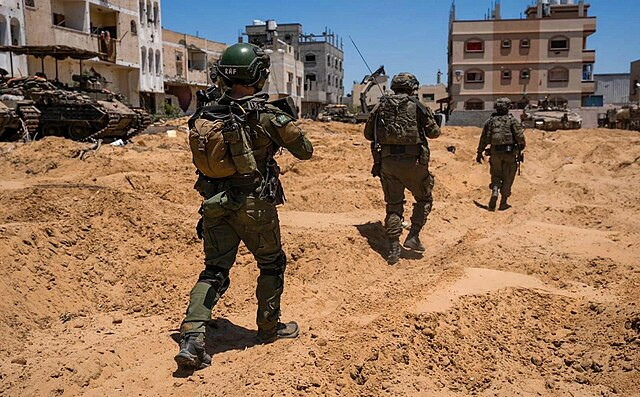In a diplomatic impasse that underscores the fraught nature of negotiations in the ongoing Gaza conflict, disagreements between Israel and Hamas over troop deployment and prisoner releases have brought a potential ceasefire deal to a standstill. According to sources involved in U.S.-mediated talks, the discord centers on Israel's insistence on maintaining a military presence in strategic areas of Gaza-a demand that Hamas views as a last-minute shift in Israel's position.
The talks, which concluded last week without resolution, have highlighted the deep divisions between the two sides. Israeli demands for a continued military presence along the Netzarim Corridor and the Philadelphi Corridor have emerged as significant roadblocks. These corridors, which Israel cleared during the current conflict, are crucial for controlling movement between northern and southern Gaza and securing Gaza's border with Egypt. For Hamas, these demands represent a fundamental change in the terms previously discussed, raising concerns that any concessions could lead to further demands from Israel.
A source close to the negotiations told Reuters, "Hamas is particularly alarmed by Israel's insistence on stationing troops in these corridors, as it fundamentally alters the parameters of the agreement they were initially willing to accept."
Israel's position, which was reiterated by Prime Minister Benjamin Netanyahu's office, argues that maintaining control over these areas is essential for national security, particularly to prevent the movement of Hamas fighters and to secure the southern border with Egypt. Netanyahu's office denied making new demands, stating that their position builds on previous proposals, specifically a May 2024 ceasefire proposal put forth by U.S. President Joe Biden.
Despite these assurances, Hamas views the demands as a significant deviation from earlier commitments. The militant group is also concerned about the proposed deportation of Palestinian prisoners in exchange for hostages held by Hamas since the conflict erupted on October 7. The idea of releasing prisoners into exile, rather than allowing them to return to Gaza or the West Bank, has been a contentious issue, further complicating negotiations.
U.S. Secretary of State Antony Blinken, who concluded a rapid diplomatic tour of the region last week, has been actively involved in bridging the gaps between the two sides. After meeting with Netanyahu, Blinken announced that Israel had accepted a new U.S. proposal aimed at narrowing differences, urging Hamas to do the same. However, the details of this "bridging proposal" remain unclear, and sources suggest that significant disagreements persist.
The Philadelphi Corridor, which runs along Gaza's border with Egypt, is particularly sensitive for Cairo. Egypt has expressed its willingness to enhance security measures in this area but firmly rejects the presence of Israeli troops. This corridor is crucial not only for controlling smuggling routes into Gaza but also for ensuring that Egypt retains its role as a key mediator in the conflict. An Israeli military presence in this area would effectively give Israel control over Gaza's only border that does not directly connect to Israeli territory-a scenario that Egypt and Hamas are keen to avoid.
Meanwhile, the humanitarian situation in Gaza continues to deteriorate. The closure of the Rafah crossing, due to the conflict, has severely limited the flow of humanitarian aid and medical evacuations, exacerbating the already dire conditions in the enclave. The blockade has left Gaza's 2.3 million residents with dwindling supplies of food, water, and medical care, while the ongoing conflict has claimed more than 40,000 lives, according to Palestinian health authorities.
As the next round of talks is expected to take place in Cairo, the stakes remain high. The United States, along with mediators from Qatar and Egypt, is pushing to keep negotiations alive in the hopes of ending Israel's 10-month military campaign in Gaza and securing the release of remaining hostages. However, with Israel's war objectives-including securing the southern border-still firmly in place, and Hamas's resistance to what it sees as an encroachment on Gaza's autonomy, the path to a ceasefire remains perilous.
The situation underscores the broader challenges of achieving peace in the region. As one Western diplomat noted, "The longer these talks drag on without a resolution, the more entrenched both sides become in their positions, making any compromise increasingly difficult to achieve."




